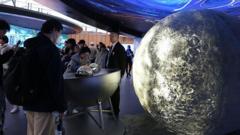China is opening up its rare lunar samples to the world, allowing scientists from six countries, including the United States, to study the rocks collected during the Chang'e-5 mission in 2020. This decision, announced by the China National Space Administration (CNSA), shows a willingness to engage in international scientific collaboration, even as trade tensions remain high between the two nations.
CNSA chief Shan Zhongde described the lunar samples as "a shared treasure for all humanity," reflecting the significance of the endeavor beyond national borders. Currently, US researchers cannot access NASA's lunar samples due to legal restrictions imposed by US lawmakers, specifically a 2011 law that bans NASA from collaborating with China without Congressional approval.
John Logsdon, a former director of the Space Policy Institute at George Washington University, downplayed the political implications of sharing the samples, stating that while there are restrictions on technology, the study of lunar rock does not hold any military significance. This opens the door for scientific cooperation to thrive as it is considered the norm amongst nations.
In light of the ongoing trade war, characterized by aggressive tariffs—up to 245% on Chinese goods and 125% on US goods—this collaboration shines a light on the possibility of constructive dialogues in other realms. Though US-China trade relations were hinted to be easing, Beijing firmly denied any talks of rapprochement.
The Chang'e-5 moon samples are particularly interesting to scientists because they are believed to be approximately a billion years younger than those retrieved during the Apollo missions, suggesting more recent volcanic activity on the Moon than previously thought.
While negotiations for a sample exchange reportedly took place last year between US and Chinese space officials, they did not lead to any agreement. Research institutions from France, Germany, Japan, Pakistan, and the UK also secured bids to study the samples alongside Brown University and Stony Brook University from the US.
As China embarks on a path of increased openness in space research, Shan forecasted a growing international network for collaboration within the context of the Belt and Road Initiative, stating, "I believe China's circle of friends in space will continue to grow."
CNSA chief Shan Zhongde described the lunar samples as "a shared treasure for all humanity," reflecting the significance of the endeavor beyond national borders. Currently, US researchers cannot access NASA's lunar samples due to legal restrictions imposed by US lawmakers, specifically a 2011 law that bans NASA from collaborating with China without Congressional approval.
John Logsdon, a former director of the Space Policy Institute at George Washington University, downplayed the political implications of sharing the samples, stating that while there are restrictions on technology, the study of lunar rock does not hold any military significance. This opens the door for scientific cooperation to thrive as it is considered the norm amongst nations.
In light of the ongoing trade war, characterized by aggressive tariffs—up to 245% on Chinese goods and 125% on US goods—this collaboration shines a light on the possibility of constructive dialogues in other realms. Though US-China trade relations were hinted to be easing, Beijing firmly denied any talks of rapprochement.
The Chang'e-5 moon samples are particularly interesting to scientists because they are believed to be approximately a billion years younger than those retrieved during the Apollo missions, suggesting more recent volcanic activity on the Moon than previously thought.
While negotiations for a sample exchange reportedly took place last year between US and Chinese space officials, they did not lead to any agreement. Research institutions from France, Germany, Japan, Pakistan, and the UK also secured bids to study the samples alongside Brown University and Stony Brook University from the US.
As China embarks on a path of increased openness in space research, Shan forecasted a growing international network for collaboration within the context of the Belt and Road Initiative, stating, "I believe China's circle of friends in space will continue to grow."





















